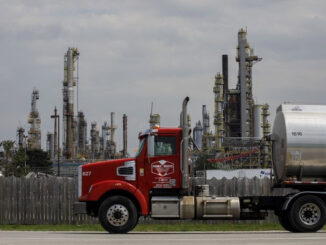
The leaders of South Korea and Canada say they will strengthen their security and economic cooperation to address challenges posed by North Korea and expand Canadian supplies of minerals crucial to South Korea’s technology industry.
The meeting on Wednesday in Seoul between South Korean President Yoon Suk-yeol and Canadian Prime Minister Justin Trudeau came before they travel to Japan for this weekend’s Group of Seven summit, where discussions are expected to focus on geopolitical uncertainties worsened by Russia’s war on Ukraine, China’s regional assertiveness and North Korea’s nuclear ambitions.
In a joint statement issued after their meeting, the two leaders condemned North Korea’s growing nuclear weapons and ballistic missile programme and urged Pyongyang to return to US-led denuclearization talks, which have been stalled since 2019 over disagreements related to international sanctions imposed on the North.
Yoon and Trudeau expressed concern over North Korea’s human rights violations and “the regime’s complete disregard for the wellbeing of its people”. They said their governments would try to improve international awareness about the issue.
“We will also be continuing our work to support human rights organizations” focused on advancing North Korean human rights, Trudeau said in a joint news conference with Yoon.
Yoon and Trudeau met before they travel to Japan for a weekend Group of Seven summit [Kim Hong-ji/Reuters]
“North Korean people are the first victims of the terrible regime in North Korea, an example of why autocracy has terrible, terrible impacts on its own people first and foremost before [it] even destabilizes and puts at risk people in neighboring countries,” Trudeau said.
The leaders signed a memorandum of understanding on critical mineral supply chains, a clean energy transition and energy security, which they said would help position the countries as “globally competitive players in areas including batteries and zero-emission vehicles”.
“This will support the development of clean technologies that will power green and sustainable economic growth,” they said in the joint statement.
Trudeau, the first Canadian leader to visit South Korea in nine years, said his government remains committed to working closely with Seoul and other international partners to address the North Korean threat. He said his government will work to enhance Canada’s naval presence and participation in multinational operations to monitor the enforcement of UN Security Council sanctions against Pyongyang.
Yoon said the two countries will expand cooperation in “future industries”, including semiconductors, batteries, artificial intelligence and technologies producing cleaner energy, including those involving small modular reactors, natural gas and hydrogen.
Yoon’s government has described the country’s trade relations with Canada as essential for coping with instabilities in global supply chains and energy markets. Canada is one of the world’s largest producers of oil and natural gas and key minerals like nickel, lithium and cobalt, which are used by South Korean companies to manufacture electric car batteries.
South Korea’s Trade Ministry said in a statement that a stronger partnership with Canada on minerals would allow the country to better cope with the impact of the US Inflation Reduction Act, which aims to reduce US dependence on China and other countries for battery supply chains.
The act, which was signed into law by President Joe Biden in August, has been a source of tension between Washington and Seoul as it excludes South Korean electric vehicles and other models assembled outside of North America from consumer tax credits.
Trudeau said his meeting with Yoon also included discussions about China, which remains South Korea’s largest trade partner but is increasingly diverging from Seoul over security issues.
There is frustration in Seoul over how Beijing and Moscow have blocked US-led efforts in the UN Security Council to tighten sanctions on North Korea after it has ramped up missile tests since the start of 2022. There are also concerns about how an intensifying US-China rivalry over trade and technology and a fragmentation of global supply chains could hurt South Korea’s export-dependent economy.
“We recognize, both of us, that China is an important economic partner, not just in the region but around the world,” Trudeau said. “But we need to know where we are going to be competing with China on economic grounds and where we need to challenge China on human rights and other issues.”
Hours before his summit with Yoon, Trudeau delivered a speech to South Korean lawmakers in Seoul’s National Assembly, where he made similar comments on security and economic cooperation and responding to the North Korean threat. Trudeau was the first foreign leader to deliver a speech to South Korea’s parliament since former US President Donald Trump in 2017.
President Yoon and PM Trudeau focus on security, clean energy and critical mineral supplies ahead of G7 summit in Japan.
ENB Top News
ENB
Energy Dashboard
ENB Podcast
ENB Substack



